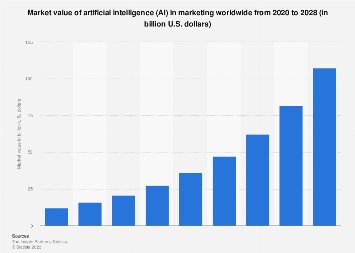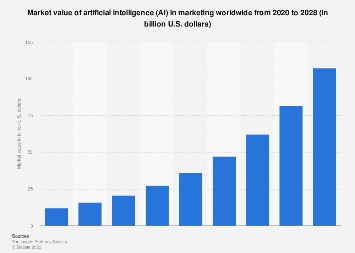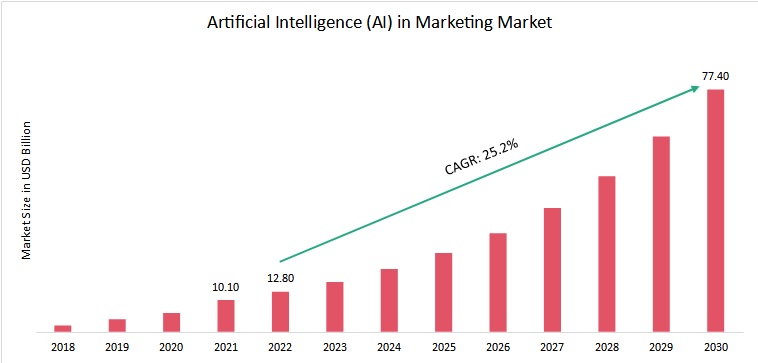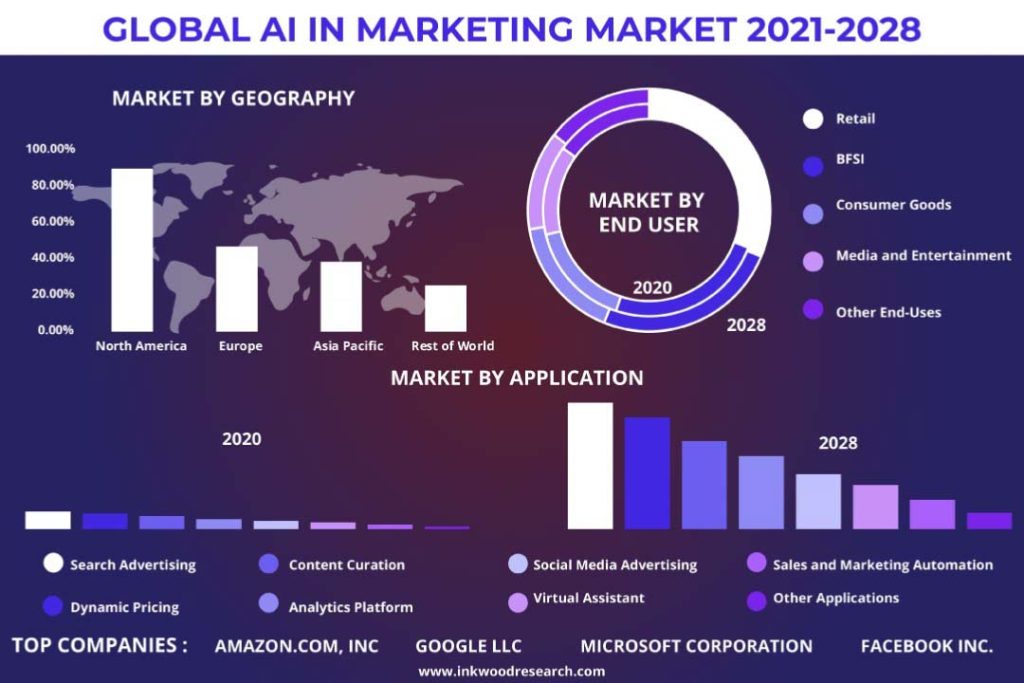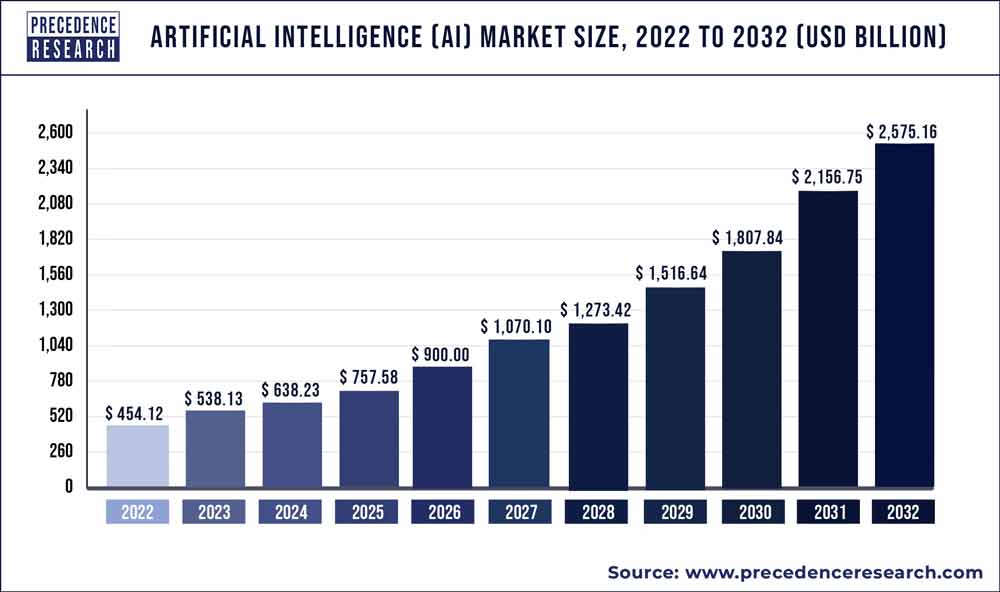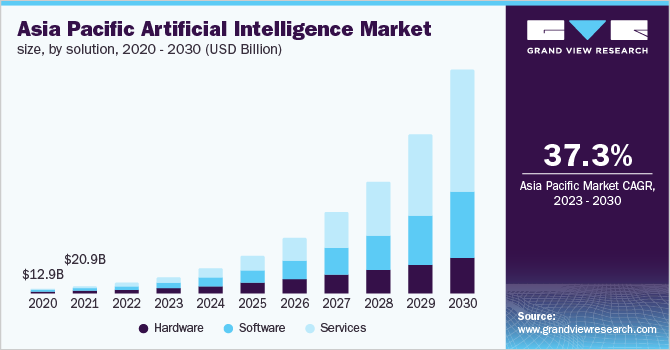Have you ever wondered just how big the AI market will become? Well, the future of artificial intelligence is nothing short of extraordinary. With advancements in technology and its increasing integration into various industries, the AI market is expected to experience exponential growth in the coming years. From autonomous vehicles to virtual personal assistants, AI is revolutionizing the way we live and work. So, buckle up and get ready to explore the incredible potential and enormous size of the AI market.
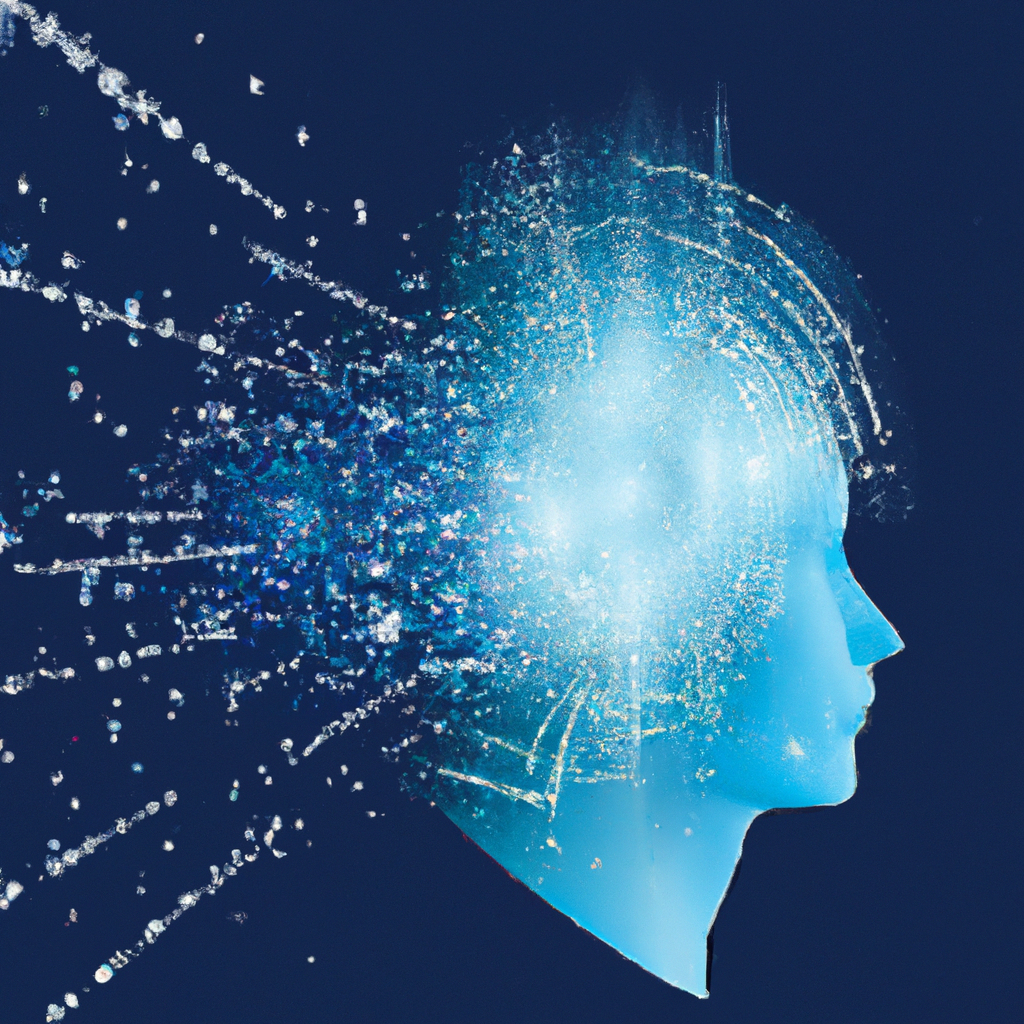
Current size of the AI market
Global AI market size
The AI market has grown exponentially in recent years, with its global size reaching new heights. According to market research, the global AI market was valued at $39.9 billion in 2019. This impressive figure is expected to witness substantial growth and reach a market size of $733.7 billion by 2027. The increase in market size is primarily attributed to the growing adoption of AI technology across various industries.
AI market growth rate
The AI market is experiencing a significant growth rate due to technological advancements and increased demand for AI-powered solutions. The compound annual growth rate (CAGR) of the AI market is projected to be around 42.2% from 2020 to 2027. This growth rate indicates the immense potential and opportunities that the AI market holds for both existing and emerging players in the industry. The favorable growth rate is driven by a combination of factors, including investment in research and development, implementation across industries, and increasing demand for automation.
Key players in the AI market
The AI market is filled with numerous key players who contribute to its growth and innovation. Companies such as Google, Microsoft, IBM, and Amazon are leading the way in AI technology development and implementation. These tech giants are constantly investing in AI research, cutting-edge technologies, and exploring new applications. Additionally, startups and innovation hubs are also making significant contributions to the AI market by introducing disruptive solutions and pushing the boundaries of what AI can achieve.
Factors influencing the size of the AI market
Technological advancements
One of the primary factors influencing the size of the AI market is the continuous advancements in technology. As AI algorithms and computing power improve, the capabilities and applications of AI expand. Innovations such as deep learning, neural networks, and machine learning algorithms have paved the way for more sophisticated AI systems. The combination of these advancements with increased computational capacity has significantly contributed to the growth of the AI market.
Increasing demand for automation
The rising demand for automation across industries is a key driver of the AI market’s growth. Businesses are looking for ways to streamline their operations, improve efficiency, and reduce costs. AI technologies, such as robotic process automation (RPA), autonomous systems, and intelligent automation, offer solutions to these challenges. By automating repetitive and mundane tasks, AI enables companies to focus on more strategic and value-added activities, thereby fostering the expansion of the AI market.
Implementation across industries
AI is being implemented across a wide range of industries, including healthcare, retail, manufacturing, banking and financial services, transportation, media and entertainment, and many others. Each industry has its own unique challenges and opportunities where AI can make a significant impact. For example, in healthcare, AI is utilized for medical diagnosis, drug discovery, and personalized patient care. In retail, AI is employed for demand forecasting, inventory management, and personalized marketing. This widespread adoption of AI across various sectors contributes to the growth of the overall AI market.
Investment in AI research and development
The consistent investment in AI research and development plays a crucial role in the expansion of the AI market. Governments, organizations, and institutions are increasingly allocating funds to AI-related projects, aiming to push the boundaries of AI technology and unlock its full potential. These investments not only drive innovation but also foster collaborations between academia and industry. By supporting AI research and development, stakeholders contribute to the growth of the AI market and the realization of its benefits across sectors.
AI market by industry
Healthcare
AI has transformative potential in the healthcare industry. It can assist in medical diagnosis, automate administrative tasks, improve patient care, and enable personalized medicine. Machine learning algorithms can analyze vast amounts of medical data to identify patterns and make accurate predictions, aiding physicians in making informed decisions. Additionally, AI-powered robotic surgery systems enhance precision and minimize invasiveness. The healthcare sector is expected to witness significant AI adoption in the coming years.
Retail
AI has revolutionized the retail industry, providing insights and solutions to improve customer experience, optimize supply chain management, and enhance sales forecasting. Intelligent algorithms can analyze customer data to offer personalized recommendations, while chatbots and virtual assistants offer 24/7 customer support. AI-powered inventory management systems help retailers optimize stock levels, reduce waste, and streamline operations. The retail industry benefits greatly from AI’s ability to unlock valuable insights from vast amounts of data and simplify complex processes.
Manufacturing
AI is reshaping the manufacturing industry by enabling automation, predictive maintenance, and quality control. Smart factories leverage AI algorithms to optimize production processes, minimize downtime, and achieve cost efficiencies. Machine learning algorithms analyze sensor data to predict machinery failures, allowing proactive maintenance measures. Computer vision systems inspect products for defects, ensuring quality standards are met. The integration of AI in manufacturing enhances productivity, reduces errors, and fosters innovation.
Banking and Financial Services
The banking and financial services industry utilizes AI to improve fraud detection, provide personalized financial advice, and automate routine tasks. AI-powered chatbots and virtual assistants offer efficient customer support, while machine learning algorithms analyze financial data to identify fraudulent transactions. AI algorithms can analyze market trends and patterns to provide accurate predictions for investment decisions. The adoption of AI in banking and financial services enhances customer experience, reduces costs, and improves decision-making processes.
Transportation
AI is revolutionizing the transportation industry through autonomous vehicles, intelligent traffic management systems, and logistics optimization. Self-driving cars powered by AI algorithms can improve road safety and increase efficiency. Traffic management systems utilize AI to analyze real-time data and optimize traffic flow. Logistics companies benefit from AI-powered route planning and fleet management systems, reducing fuel consumption and delivery times. The transportation industry’s adoption of AI is expected to bring about significant advancements in mobility and logistics.
Media and Entertainment
The media and entertainment industry leverages AI for content recommendation, audience insights, and content creation. AI algorithms analyze user preferences and behavior to offer personalized content recommendations, improving user engagement and retention. Content creators utilize AI tools for video and image editing, natural language generation, and virtual reality experiences. AI-powered voice recognition and natural language processing enable interactive and personalized media experiences. AI has transformed the way media is consumed, produced, and distributed.
Others
AI is also making an impact in other industries such as agriculture, energy, telecommunications, and education. In agriculture, AI helps optimize crop yields, monitor soil conditions, and automate farm operations. Energy companies utilize AI for demand forecasting, predictive maintenance, and energy grid optimization. AI-powered virtual assistants and chatbots enhance customer support and self-service capabilities in the telecommunications industry. In education, AI enables personalized learning experiences, adaptive assessments, and intelligent tutoring systems. The potential applications of AI across industries are vast and continue to expand.

Emerging trends in the AI market
Natural Language Processing (NLP)
Natural Language Processing (NLP) utilizes AI algorithms to enable computers to understand and interpret human language. NLP is used in various applications such as chatbots, virtual assistants, voice recognition systems, and language translation. NLP advancements have contributed to improved human-computer interaction and have the potential to revolutionize how we communicate with technology.
Computer Vision
Computer Vision involves AI algorithms that enable computers to interpret and understand visual information from images and videos. Computer Vision is utilized in applications such as facial recognition, object detection, autonomous vehicles, and surveillance systems. The ability of machines to analyze and understand visual data has broad implications for industries such as healthcare, retail, and manufacturing.
Edge AI
Edge AI refers to AI algorithms and computation performed on edge devices such as smartphones, IoT devices, or drones, rather than relying on cloud computing. Edge AI reduces latency and enables real-time decision-making without relying on a constant internet connection. This trend is increasingly important in applications such as autonomous vehicles, smart homes, and industrial automation.
AI-as-a-Service
AI-as-a-Service (AIaaS) allows organizations to access and utilize AI capabilities without the need for extensive AI infrastructure. By leveraging cloud-based platforms and APIs, businesses can integrate AI functionalities into their applications and services. AIaaS enables easier adoption of AI technology for organizations without the need for significant initial investment in infrastructure and resources.
AI-powered chatbots
AI-powered chatbots are becoming increasingly prevalent in customer service and support applications. These chatbots utilize AI algorithms to understand and respond to customer queries and provide personalized assistance. By implementing AI-powered chatbots, businesses can enhance customer experience, streamline support processes, and reduce costs associated with human customer service representatives.
Challenges and limitations
Ethical considerations
As AI continues to advance, ethical considerations become increasingly important. Concerns such as algorithmic bias, privacy infringement, and potential job displacement need to be addressed to ensure responsible AI development and deployment. Efforts are being made to develop ethical guidelines and frameworks to guide the responsible usage of AI technology.
Data privacy and security
The growth of the AI market heavily relies on the availability and use of vast amounts of data. Ensuring data privacy and security is crucial to maintain user trust and mitigate the risks of data breaches and misuse. AI systems need to comply with privacy regulations and implement robust security measures to protect sensitive data.
Lack of skilled professionals
The demand for skilled AI professionals exceeds the current supply, creating a talent gap in the AI job market. There is a shortage of individuals with the necessary expertise in AI development, data science, and machine learning. Bridging this gap through education, training programs, and partnerships between academia and industry is essential to sustain the growth of the AI market.
Cost of implementation
Implementing AI technology can be costly, especially for small and medium-sized enterprises (SMEs). The initial investment in infrastructure, software, and expertise may pose financial challenges for organizations. Additionally, ongoing maintenance and updates require continued investment. These cost considerations may limit the adoption of AI technology, particularly for organizations with limited resources.
Regional analysis
North America
North America leads the AI market with a significant share due to the presence of major AI companies, research institutions, and a favorable ecosystem for technological advancements. The United States, in particular, contributes significantly to the development and adoption of AI technologies. The North American market is expected to continue its dominance in the coming years, driven by strategic investments and continuous innovation.
Europe
Europe has a strong presence in the AI market, with significant contributions from countries such as the United Kingdom, Germany, France, and Sweden. The European Union has implemented regulations and initiatives to promote responsible AI development and ensure data protection. Europe is poised to witness substantial AI market growth, driven by government support, research collaborations, and industry partnerships.
Asia Pacific
The Asia Pacific region is emerging as a major player in the AI market, with countries like China, Japan, and South Korea at the forefront of AI adoption and innovation. China, in particular, has made significant investments in AI research and development, aiming to become a global leader in AI technology. The rapid growth of the Asia Pacific market can be attributed to the region’s large population, increasing digitalization, and advancements in AI research.
Latin America
Latin America is experiencing a steady growth in the AI market, driven by digital transformation initiatives, increasing investment in technology, and the adoption of AI solutions across various industries. Countries like Brazil, Mexico, and Argentina are witnessing significant advancements in the AI sector, with startups and innovation hubs contributing to the growth of the market.
Middle East and Africa
The Middle East and Africa region show promising potential for the AI market. Countries like the United Arab Emirates, Saudi Arabia, and South Africa are leading the way in AI adoption, driven by government initiatives, investment in technology, and the establishment of AI research centers. The region’s growing interest in AI technology and potential applications fuel the market’s growth.
Future projections and forecasts
Projected market size
The future projections for the AI market are highly optimistic, indicating substantial growth in the coming years. It is projected that by 2027, the global AI market will reach a size of $733.7 billion, with a CAGR of 42.2%. This remarkable growth is fueled by technological advancements, increasing demand for automation, and the widespread adoption of AI across industries.
Growth potential of AI market
The growth potential of the AI market is immense. As AI technologies continue to mature and evolve, their potential applications will expand to new industries and sectors. The incorporation of AI in areas such as education, agriculture, energy, and telecommunications presents significant growth opportunities. Additionally, the continuous investment in AI research and development will drive further innovation and push the boundaries of what AI can achieve.
Market opportunities and challenges
The AI market offers numerous opportunities for both established companies and startups. The demand for AI-powered solutions across industries creates a fertile ground for innovation and entrepreneurship. However, the market also presents challenges such as intense competition, data privacy concerns, and regulatory frameworks. Navigating these challenges while capitalizing on the market opportunities requires strategic planning, continuous innovation, and a customer-centric approach.
Key players in the AI market
Leading AI companies
Leading AI companies such as Google, Microsoft, IBM, and Amazon are at the forefront of AI technology development and implementation. These companies have deep expertise in AI research, vast amounts of data, and extensive resources, allowing them to drive innovation and shape the AI market. Their products and services span various industries and provide solutions to complex challenges.
AI startups and innovation hubs
AI startups and innovation hubs play a vital role in the AI market by introducing disruptive solutions and driving innovation. These startups often focus on specific niche areas and bring fresh perspectives and agility to the market. Venture capital funding and support from innovation ecosystems enable startups to develop cutting-edge AI technologies and contribute to the overall growth of the market.
AI-powered products and services
AI-powered products and services are becoming increasingly prevalent in the market. From AI-powered virtual assistants to autonomous vehicles and chatbot applications, AI is transforming how we interact with technology and access services. AI-powered healthcare platforms, smart home devices, and predictive analytics software are just a few examples of the innovative products and services enabled by AI.
Government initiatives and regulations
AI strategy and policies
Governments around the world are recognizing the importance of AI and are developing strategies and policies to foster AI development and its responsible use. These initiatives aim to support AI research and development, encourage innovation, and ensure ethical practices. Governments also strive to create an enabling environment for AI adoption by providing funding, infrastructure, and regulatory frameworks.
Ethical guidelines and frameworks
To address ethical considerations associated with AI, governments, organizations, and institutions are developing ethical guidelines and frameworks. These guidelines aim to ensure transparency, fairness, and accountability in AI development and deployment. By establishing ethical norms, stakeholders aim to harness the benefits of AI technology while mitigating potential risks.
Impact on employment
The adoption of AI technology has implications for employment. While AI can automate routine and repetitive tasks, it also creates new roles and opportunities. The impact on employment varies across industries and job functions. Some jobs may be at risk of automation, while others may require new skill sets to work alongside AI systems. Governments and organizations need to closely monitor these changes and develop strategies to reskill and upskill the workforce to adapt to the evolving job market.
Conclusion
The AI market is experiencing unprecedented growth, fueled by technological advancements, increasing demand for automation, and widespread implementation across industries. The global AI market size is expected to reach $733.7 billion by 2027, with a compound annual growth rate of 42.2%. AI is transforming various sectors, including healthcare, retail, manufacturing, banking and financial services, transportation, media and entertainment, and many more. Emerging trends such as Natural Language Processing, Computer Vision, Edge AI, AI-as-a-Service, and AI-powered chatbots are revolutionizing the way we interact with technology and access services. However, the AI market also faces challenges such as ethical considerations, data privacy, the talent gap, and the cost of implementation. Governments, organizations, and stakeholders play a crucial role in shaping the AI market through initiatives, regulations, and the development of ethical guidelines. As the AI market continues to evolve, it presents numerous opportunities and challenges for key players, startups, and innovators. With strategic planning, continuous innovation, and responsible practices, the AI market holds immense potential for growth and transformation in the years to come.






